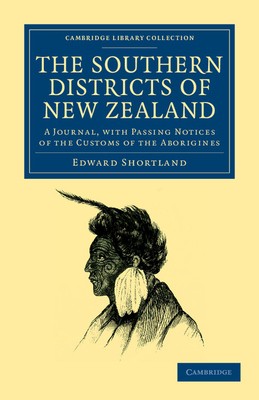
- We will send in 10–14 business days.
- Author: Edward Shortland
- Publisher: Cambridge University Press
- ISBN-10: 1108040632
- ISBN-13: 9781108040631
- Format: 14 x 21.6 x 2.1 cm, minkšti viršeliai
- Language: English
- SAVE -10% with code: EXTRA
Reviews
Description
The physician and ethnographer Edward Shortland (1812-93) first travelled to New Zealand in 1841, a year after the Treaty of Waitangi. He became private secretary to Governor William Hobson, and quickly learned the Maori language. First published in 1851, this book describes Shortland's experiences on the east coast of New Zealand's South Island while conducting a census of the local Maori settlements in 1843. It documents South Island Maori myths, traditions and everyday life, and includes genealogical tables and a short word-list of the local dialect. It also describes a French Company agent at Akaroa reporting the successful introduction of French vines, the Scottish settlement at Dunedin, and the productivity of several whaling stations. Shortland reminds prospective settlers of the importance of understanding the 'ideas and prejudices' of the Maori, whose many qualities including 'natural bravery and love of freedom' guarantee them continuing 'political weight in their own country'.
EXTRA 10 % discount with code: EXTRA
The promotion ends in 21d.17:35:57
The discount code is valid when purchasing from 10 €. Discounts do not stack.
- Author: Edward Shortland
- Publisher: Cambridge University Press
- ISBN-10: 1108040632
- ISBN-13: 9781108040631
- Format: 14 x 21.6 x 2.1 cm, minkšti viršeliai
- Language: English English
The physician and ethnographer Edward Shortland (1812-93) first travelled to New Zealand in 1841, a year after the Treaty of Waitangi. He became private secretary to Governor William Hobson, and quickly learned the Maori language. First published in 1851, this book describes Shortland's experiences on the east coast of New Zealand's South Island while conducting a census of the local Maori settlements in 1843. It documents South Island Maori myths, traditions and everyday life, and includes genealogical tables and a short word-list of the local dialect. It also describes a French Company agent at Akaroa reporting the successful introduction of French vines, the Scottish settlement at Dunedin, and the productivity of several whaling stations. Shortland reminds prospective settlers of the importance of understanding the 'ideas and prejudices' of the Maori, whose many qualities including 'natural bravery and love of freedom' guarantee them continuing 'political weight in their own country'.


Reviews